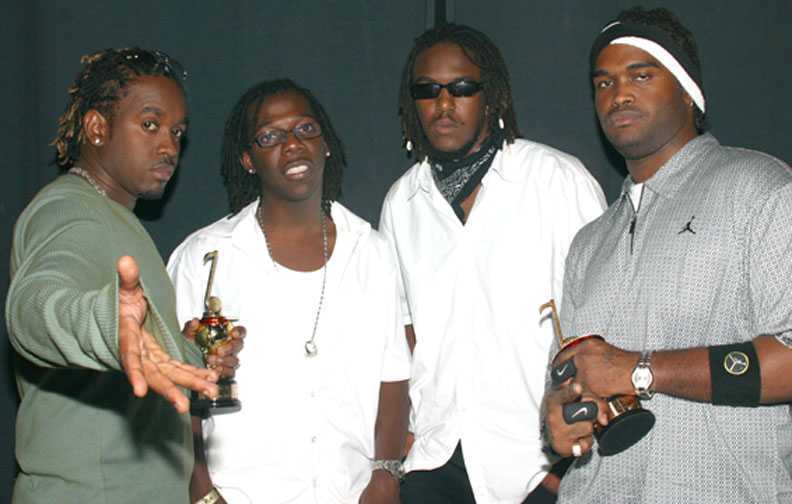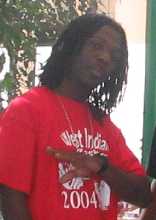TOK, an acronym for Touch Of Klass, is comprised of 26 and 27-year-olds Xavier Flexx Davidson, Roshaun Bay-C Clarke, Craig “Craigy T Thompson, and Alistaire Alex McCalla. The quartet has been singing together for twelve years–three of them started out in the school choir at Campion College. Their debut album My Crew, My Dawgs was released on VP Records in 2002 and their follow up, still untitled on VP/Atlantic, is scheduled for a June 2004 release. “What we do is like a blender,” says Bay-C, describing the TOK sound.
Of course, as a progressive-thinking female, I thought their reputation was somewhat compromised when they released Chi Chi Man in 2000, the #1 charted anti-gay anthem. Chi-chi is a reference to any corrupt person, but the slang refers specifically to gay men. Despite the politically incorrect lyrics, I couldn’t shake the affinity I had for TOK. They are real musicians. They are talented. They reach me in a way that only a handful of dancehall artists can. To call them the Jamaican B2K, or the Jamaican Backstreet Boys is a demeaning marketing ploy – they are much more than eye candy, although, for the record, the four of them are extremely good looking.
It took me four years until I was able to see them perform. To date, no promoter has brought them north of the Los Angeles area. I don’t blame them–Northern California is home not only to the gay capital of the world, but its the roots reggae capital as well. Not so surprisingly, I had to travel to Long Beach to get my TOK fix.
The Bob Marley Festival in Long Beach on February 14 and 15, 2004 boasted a rich line-up of roots and dancehall artists and it only seemed fitting that TOK performed on Valentines Day. Their energetic set included new and old tunes alike, including hits Shake Your Bam Bam, Eagles Cry, Gal Yu A Lead, Money to Burn, Just Got Paid, and of course Chi Chi Man. They specifically dedicated about half of their set to the ladies although, in my estimation, it was more like 99%.
The following day, I sat down with them for about twenty minutes to find out what they were all about. I found the four of them to be professional, down-to-earth, upstanding men of the community. I had imagined deciphering some thick patois, but they spoke articulately and eloquently. Their warmth was contagious and by the end of the interview, I wanted to bring them all home and cook them a nice Sunday meal.
Laura Gardner (LG): Tell me a bit about growing up in Portmore [outside Kingston, Jamaica] and how you all met.
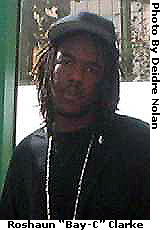 Bay-C: Growing up in Portmore is a nice vibe. We went to different schools Flexx went to Calabar and the rest of us went to Campion College. Alex and Flexx grew up on the same road in Bridgeport – big up to all Bridgeport crew! I grew up in Hellshire. Basically, its the same as growing up anywhere else in Jamaica. You go out. You go to parties, street dances, fetes. We performed at a couple of the fetes as teenagers. It was a nice vibe! Craigy was from Kingston. Craig used to come over every time – he never really liked Portmore still – but he used to come over anyway [laughs].
Bay-C: Growing up in Portmore is a nice vibe. We went to different schools Flexx went to Calabar and the rest of us went to Campion College. Alex and Flexx grew up on the same road in Bridgeport – big up to all Bridgeport crew! I grew up in Hellshire. Basically, its the same as growing up anywhere else in Jamaica. You go out. You go to parties, street dances, fetes. We performed at a couple of the fetes as teenagers. It was a nice vibe! Craigy was from Kingston. Craig used to come over every time – he never really liked Portmore still – but he used to come over anyway [laughs].
LG: I was just there in Portmore at a street dance.
Bay-C: Right by Cactus?
LG: Yeah, exactly! The first song I heard from you was “Eagles Cry” when I was in Jamaica in ’99. I remember just being floored by your sound. In the press conference I asked you about your harmonies because that’s what strikes me the most about it. It reminds me a bit of General Degree, who has really nice harmony and melody in his sound. Can you tell me which artists have influenced you in the past, and has it been different for each of you?
Flexx: It’s somewhat different, but its kind of the same. With me, it would have to be Stevie Wonder, Barrington Levy, along with the DJs like Tiger, Supercat, Shabba Ranks.
Bay-C: For me its similar, but I would have to say I got inspiration from cultural artists also like Steel Pulse, Bob Marley, Third World. In the ’80s, I definitely looked up to that international reggae sound. I always adored that sound. Then [I got inspiration from] the dancehall DJs. The first DJ that I actually respected was Major Mackerel. The Iyw sound! I couldn’t get over that. As Flexx said Shabba Ranks, Supercat, Tiger, and of course Bounty Killer [were all influences]. I got a lot of inspiration from pop artists too like Eurythmics.
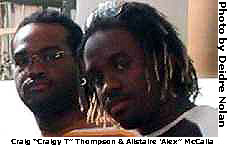 Craigy T: I was inspired a lot by Jacob Miller. I used to like the sound of Luther Vandross as well on a more international level. Mi really love hardcore dancehall – thats really where I get most of my inspiration from! A whole heap of Shabba Ranks. A whole heap of Ninjaman. Bounty Killer. Supercat. Buju BantonI used to try to DJ like Buju when I was in high school! That’s what inspired me.
Craigy T: I was inspired a lot by Jacob Miller. I used to like the sound of Luther Vandross as well on a more international level. Mi really love hardcore dancehall – thats really where I get most of my inspiration from! A whole heap of Shabba Ranks. A whole heap of Ninjaman. Bounty Killer. Supercat. Buju BantonI used to try to DJ like Buju when I was in high school! That’s what inspired me.
Alex: I got a lot of inspiration from 80s music and 80s dancehall vibe. My main inspiration, though, came from Michael Jackson. Yeah, yeah – the whole nine yardswe can move on from there! [laughs]
LG: In the press conference you were telling me a bit about how you create a sound and how its a collaborative effort with everyone’s input. Can you describe what a day in the studio is like for you?
Bay-C: It has changed a lot over the years. When we used to go in the studio we used to have the songs written out before we went in. We would have to get the track, write the song, and have it arranged. Then we realized to get more personal with the music and to be one with the track–to put your spirit out there–we started going to the studio and hearing the riddim and creating that song right there on the spot.
The four of us listen to tracks. We throw out different ideas – probably four or five ideas before we choose which one is for the chorus. Then we go about arranging the verses, arrange the whole song, and then we go in and actually record it. So, basically were just having fun in the studio. That’s the essence of what we want to do. We don’t want it to sound fabricated or predetermined. We want it to sound as real as possible.
LG: How do you decide whose riddims you record on?
Bay-C: That comes down to…
Flexx: What riddims we like!
Bay-C: Yeah, what riddims we like and what riddims are hot. We have a certain ear for the music. We don’t just record because this producer or riddim is hot. It has to sound like it will complement us and its something that we say, Yo, we love this riddim. Mi waan do it, even if its a no-name producer. As long as the riddim talks to us like that, that’s the most important thing.
LG: There’s been a lot of controversy, at least in America, whether artists influence the culture or the culture influences the artists. Would you chime in on that?
Flexx: It’s a little bit of both, because we speak what we see happening around us. When we speak it, the people who are listening actually observe what is happening. Basically, it’s just a cycle. I don’t think its any one thing. I don’t think the culture influences us by itself. I think it’s just a circle – we take from there and the people give us inspiration.
Bay-C: Definitely. To agree with what Flexx is saying, it’s definitely a cycle. We as musicians are just a mirror of the society because we couldn’t sing something abstract that wasn’t happening and the people accept it. For people to accept it, it has to be something that they can relate to or something that they see going on. Basically we are narrators of what is going on. So we see whats going on and we put it out there and it goes right back around as a circle because we put it right back out there and people absorb it.
LG: So what slice of life are you portraying? Clearly its Jamaican, maybe urban, working-class life…
Bay-C: I think its even more than even just Jamaica. Its all the genres of music that we’ve listened to. We’ve put all that with all of our personalities and our culture – how we were brought up–and put everything into it, so its not just one or the other. Its a whole heap of stuff that’s put in to create that sound.
Craigy T: Another thing and one of the biggest plusses TOK has is that we portray unity as well. I think a lot of people around us get that vibe, because we’ve been singing together for almost twelve years. We are a family, and a lot of people get that impression when they’re around us. They can feel that spirit, that vibe that we have. So that’s very important as well.
LG: Touching a bit on that same subject, in the past few years there’s been an anti-battyman (gay) trend in the music, and now it seems that every artist has an anti-oral sex song! What do you make of that? How do you fit in? Are you going to come out with one? Its a big trend right now.
Bay-C: We are trendsetters. We don’t follow trends! With us right now, were just having fun with the music. Were not here to make any divisions amongst our fan base or division amongst the world out there. We are trying to bring people together instead of separate. We try to just make songs that everyone can relate to one way or the other and people can dance to and just relax. There is so much things going on in the world right now – world wars–all kind of stuff going on that we feel like its time to bring more love in the business more that anything that divides.
LG: Thanks for that. How do you resolve conflicts that come up between the four of you and what kind of conflicts come up?
Flexx: Basically, it’s a thing that happens over a period of time. We’ve grown to know each other and we know how each person operates in a certain situation, so basically we just leave it to time. If we have an argument about something I don’t really agree about, I will personally get away for a while [everybody laughs] and let it cool down and by the end of that period of time, everyone is just friends again.
Craigy T: As I said before, it is a family and no matter how much families argue, at the end of the day, they’re still family. You can’t change it. Were all tattooed members of TOK just to show commitment [they all show me their TOK tattoos on the top of their left hands], so it’s not a flimsy thing. It’s not a by-the-way thing. Its a serious thing.
LG: VP reps tell me you have a new album coming out in the spring. Can you tell me what the new albums about?
Bay-C: It’s coming out in June on VP/Atlantic. We don’t want to give out the name as yet but were definitely excited about it. It’s three years in the making since the last album and we’ve put so much into it – our hearts, years, tears, our careers – so were very excited about it. We can guarantee that it will be something worth the wait! If anyone knows anything about TOK, its that were perfectionists. We try our best to put out 110% in anything we do because that’s our name. If you put out 50%, then you’re going to be known as a 50% artist. So we try our best to put out 100% and the album will reflect that.
LG: Is it comprised of songs we’ve heard before or is it all new stuff?
Bay-C: We don’t really want to give that out. What we can guarantee is that [there will be] more exclusive tracks than songs out there, because a lot of artists just do compilations of their singles and call them albums – that’s not what it is! Its really an album with 100% album quality.
LG: So here we are at the Bob Marley Day Festival. How do you think your music carries on Bob Marley’s legacy? It is a step away from the Big Youth, the Edi Fitzroy, and the Sly and Robbie who were speaking [at the press conference] earlier. It probably comes about in a different way that you carry on Bob’s message and music.
Flexx: Yeah, as you say, it’s kind of different right now because dancehall music is a step away from reggae and the stuff that Bob used to do, Edi Fitzroy, and all those people. But at the same time, it’s basically the same thing. With us, we try to make music that goes further than in the dance in the hardcore Jamaica. Were trying to take it across the world and I guess that’s what Bob did. His songs reached people who didn’t even know about Jamaica.
LG: Who didn’t even speak English.
Flexx: Exactly. And that’s what we want to do. We’re doing the same thing, but in dancehall. We’re going to let our songs speak to everybody even if you don’t know what dancehall music is. We’re trying to let you feel the vibe just by hearing one song, just feel as if you’re in Jamaica.
LG: So which artists do you rate highly right now?
Bay-C: Within the Jamaican dancehall community? TOK, of course [laughs]! Personally speaking, I respect Vybz Kartel as a young youth coming up – a Portmore artist, so we have to support that! Definitely the elders – I don’t want to say elders still – but Bounty and Beenie [everybody laughs]. Bounty, if you’re listening, I never mean it as a diss [laughs]!
You dun know, Bounty, Beenie, Buju – there are so many. Degree. A lot of people don’t understand how bad Degree is. Spragga, Cobra, a whole heap of artists that definitely paved the way. Tanto Metro and Devonte, Sean Paul. Nuff a dem! We just want to play our part and contribute and make sure that if they are putting out 100%, we have to make sure were putting out 200% because its all on us to make sure that as TOK we do our stuff.
LG: Do you think you’re messengers or entertainers?
All: Both!
Bay-C: We are messengers entertaining you!
Flexx: A little bit of both because we do inspirational songs also. We did “I Believe” a couple of years ago. We have this new one that we just did for a German producer. We do songs that inspire and we do songs to have fun like “Just Got Paid,” “Shake Your Bam Bam” and all the stuff like that, so basically we are entertainers that give a message, and messengers that entertain.
Craigy T: Our music goes more along the entertaining lines, of course. I believe that the main thing for an evangelist is to be able to call people together, and sometimes they scare people away when they try to push things down your throats. We try to get people involved with us personally as much as possible. I believe that the way we are in interviews, the way we are as individuals and as a group is a shining example to everybody of how you should be and how you should live together. Yeah, conflicts come up, but its just overcoming them. Musically, we entertain. Personally, we have a message.
LG: Lastly, I see all the female teenagers screaming in Jamaica for you. How do you deal with the temptation now of having those opportunities day in and day out, more than any normal person ever would?
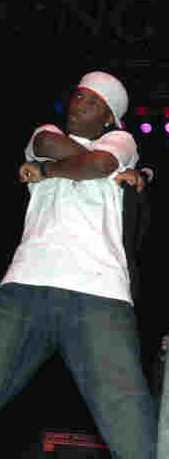
Alex in Long Beach; photo by Kevin Jackson
Alex: From the ladies, I’d have to answer that question! In terms of temptations that we have to deal with on a day to day basis as artists, you just have to learn to exercise some amount of control. You’re a role model now. A lot of normal things a normal person could do, you cant do because a lot of people look up to you and they would follow what you’d do as an example. So you have to make sure you carry yourself and pick yourself in a certain manner. Hold your prestige because sometimes people should see you but at the same time they shouldn’t be able to see you and imagine – just a little bit out of your reach to certain extent.
LG: You are incredible performers. Ive been following you for a long time, so its a real honor to be here with you.
Bay-C: You dun know. To wrap it up: this is TOK and were just doing Jah works [everybody laughs]. So big up Jahworks!
Special thanks to Chris S., Russell, Olu, and the wonderful members of T.O.K who made this interview possible. For more info on the band visit www.tokworld.com.
